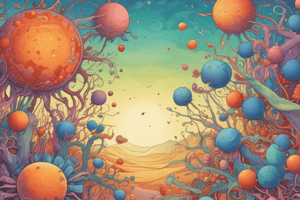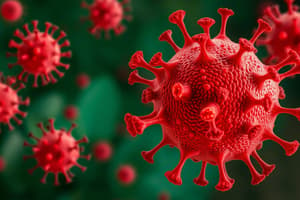Podcast
Questions and Answers
What characterizes type III hypersensitivity reactions?
What characterizes type III hypersensitivity reactions?
What causes the pathogenic nature of immune complexes in type III hypersensitivity?
What causes the pathogenic nature of immune complexes in type III hypersensitivity?
Which component primarily initiates the inflammation response in type III hypersensitivity?
Which component primarily initiates the inflammation response in type III hypersensitivity?
Where might immune complex-mediated injury occur in the body?
Where might immune complex-mediated injury occur in the body?
Signup and view all the answers
Which types of antibodies are typically involved in type III hypersensitivity reactions?
Which types of antibodies are typically involved in type III hypersensitivity reactions?
Signup and view all the answers
What is the primary mechanism involved in type III hypersensitivity reactions?
What is the primary mechanism involved in type III hypersensitivity reactions?
Signup and view all the answers
Which condition is associated with nuclear antigens in type III hypersensitivity?
Which condition is associated with nuclear antigens in type III hypersensitivity?
Signup and view all the answers
What is a characteristic of acute serum sickness?
What is a characteristic of acute serum sickness?
Signup and view all the answers
The Arthus reaction is best described as which of the following?
The Arthus reaction is best described as which of the following?
Signup and view all the answers
What type of antigens are involved in post-streptococcal glomerulonephritis?
What type of antigens are involved in post-streptococcal glomerulonephritis?
Signup and view all the answers
What triggers the inflammatory reaction in acute serum sickness?
What triggers the inflammatory reaction in acute serum sickness?
Signup and view all the answers
Which disease can involve hepatitis B virus antigens in cases of type III hypersensitivity?
Which disease can involve hepatitis B virus antigens in cases of type III hypersensitivity?
Signup and view all the answers
What occurs approximately 5 days after the injection of foreign protein in acute serum sickness?
What occurs approximately 5 days after the injection of foreign protein in acute serum sickness?
Signup and view all the answers
Study Notes
Hypersensitivity Reactions (Lecture 30, Part 2)
- Objectives: Students will learn definitions of type III and IV hypersensitivity, understand the underlying mechanisms, identify examples, and recognize clinical manifestations.
Type III Hypersensitivity
- Mechanism: Immune complexes (antigen-antibody) form in circulation and deposit in blood vessels. This activates complement and triggers inflammation.
- Definition: Antigen-antibody complexes deposit in blood vessels, activating complement and causing inflammation.
- Mechanism Detail: Antibody (IgG or IgM) combines with antigen forming complexes. These complexes deposit in tissue or blood vessel walls. This leads to complement activation, inflammation, and tissue destruction.
- Source of Antigens: Antigens can be exogenous (e.g., microbial proteins) or endogenous (e.g., nucleoproteins).
- Pathogenesis: Small amounts of complexes are usually phagocytosed and removed. Pathologic damage occurs with large amounts that persist and deposit in tissues.
- Systemic vs. Localized: Systemic damage occurs when complexes circulate and deposit in multiple organs. Localized damage occurs when complexes deposit in specific organs (e.g., kidneys, joints, skin).
- Examples: Systemic lupus erythematosus (SLE), post-streptococcal glomerulonephritis, and polyarteritis nodosa. These are illustrated in a table.
Type IV Hypersensitivity
- Mechanism: Cell-mediated; sensitized T cells respond, releasing cytokines to cause inflammation. This usually takes time to develop.
- Definition: Delayed hypersensitivity reaction mediated or caused by T cells that release cytokines causing inflammation.
- Mechanism Detail: Antigen stimulates T lymphocytes. Sensitized T lymphocytes secrete cytokines leading to inflammation.
- Examples: Granulomas, Rheumatoid arthritis, and Inflammatory bowel disease are mentioned. Granuloma formation is further detailed.
Granuloma Formation
- Mechanism: Macrophages process and present antigen (via MHC class II) to CD4+ T helper cells. Interaction leads macrophages to secrete IL-12, inducing CD4+ cells to differentiate into TH-1 subtype. These TH-1 cells secrete interferon-gamma (IFN-γ), changing macrophages into epithelioid histiocytes and ultimately giant cells.
Additional Examples
- Acute Serum Sickness: An example of systemic immune complex disease. A reaction to large amounts of foreign serum (e.g., horse serum) in passive immunization. Specific antibodies are formed 5 days later and react with the antigen forming complexes. The complexes deposit in blood vessels causing inflammation.
- Arthus Reaction: A model of experimental local immune complex diseases. In this case, antigen is injected into the skin of a previously immunized animal. This leads to tissue necrosis from acute immune complex vasculiti
Studying That Suits You
Use AI to generate personalized quizzes and flashcards to suit your learning preferences.
Related Documents
Description
This quiz covers type III and IV hypersensitivity reactions, detailing their mechanisms, definitions, pathogenesis, and clinical examples. Students will gain a comprehensive understanding of how immune complexes contribute to inflammation and tissue damage in various clinical scenarios.



